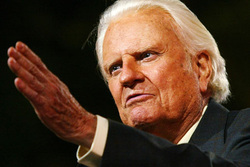
You may or may not be familiar with a game called Tri-Bond, where the challenge is to figure out what relates three apparently unrelated items. I'll try my best to bring the three threads in the title together.
Thread 1: If you were raised in conservative evangelical circles like me, you heard your fair share of Billy Graham-esque revival sermons, geared to make you face the reality of the fact that you are going to die (and probably tonight on the way home). This type of focus can quickly turn into a pie-in-the-sky-when-you-die Christianity, with little talk of the importance of love of God and neighbor in this life. But I think, in conjunction with threads 2 and 3, there is something significant about this type of focus that Christians should not abandon. If we fail to talk about death, we will never talk about the ultimate question that plagues humanity, even if the question often gets buried or forgotten in contemporary society. On top of that, if we don't talk about death, we won't talk about the hope of the resurrection, which is at the heart of the gospel.
Thread 2: In reading the dialogues of Plato again for a History of Philosophy course I'm teaching, I'm struck by the close connection between philosophy and death. For Socrates, the true philosopher is called to die daily, by which he means recognize the nature of what's really true, good, and beautiful, and live life accordingly. This focus on dying makes the true philosopher dead to the things that most humans treat with ultimate importance: wealth, fame, political power, family, etc. For Socrates, the reality of death sharpens our awareness of who/what we are as humans and the search for truth. This is not simply a skydiving, Fu-Manchu-bull-riding, bucket-list-fulfilling, Tim-McGraw-listening exercise in "living like you were dying." It's an awareness of the transience of life that raises ultimate questions about God, truth, and the nature of reality.
Thread 3: In Fight Club, in one of my favorite movie scenes of all time, Tyler Durden (played by Brad Pitt) gives a sermon to Edward Norton's never-named character (Jack? also Tyler Durden?) on the importance of recognizing that you are not in control of your life. He then proceeds to give an illustration of his point by letting go of the wheel and crashing the car in which he and three others are riding (now there's an object lesson your pastor will probably never try!).
Thread 1: If you were raised in conservative evangelical circles like me, you heard your fair share of Billy Graham-esque revival sermons, geared to make you face the reality of the fact that you are going to die (and probably tonight on the way home). This type of focus can quickly turn into a pie-in-the-sky-when-you-die Christianity, with little talk of the importance of love of God and neighbor in this life. But I think, in conjunction with threads 2 and 3, there is something significant about this type of focus that Christians should not abandon. If we fail to talk about death, we will never talk about the ultimate question that plagues humanity, even if the question often gets buried or forgotten in contemporary society. On top of that, if we don't talk about death, we won't talk about the hope of the resurrection, which is at the heart of the gospel.
Thread 2: In reading the dialogues of Plato again for a History of Philosophy course I'm teaching, I'm struck by the close connection between philosophy and death. For Socrates, the true philosopher is called to die daily, by which he means recognize the nature of what's really true, good, and beautiful, and live life accordingly. This focus on dying makes the true philosopher dead to the things that most humans treat with ultimate importance: wealth, fame, political power, family, etc. For Socrates, the reality of death sharpens our awareness of who/what we are as humans and the search for truth. This is not simply a skydiving, Fu-Manchu-bull-riding, bucket-list-fulfilling, Tim-McGraw-listening exercise in "living like you were dying." It's an awareness of the transience of life that raises ultimate questions about God, truth, and the nature of reality.
Thread 3: In Fight Club, in one of my favorite movie scenes of all time, Tyler Durden (played by Brad Pitt) gives a sermon to Edward Norton's never-named character (Jack? also Tyler Durden?) on the importance of recognizing that you are not in control of your life. He then proceeds to give an illustration of his point by letting go of the wheel and crashing the car in which he and three others are riding (now there's an object lesson your pastor will probably never try!).
| So what brings these threads together? All of them are attempts to point the observer to a basic fact that we like to ignore: we are going to die. The point, however, is not that we should despair, but that this reality of death alerts us to our own limits, finitude, and creatureliness. In other words, death can help us see what we really are: creatures of God and therefore not God. My favorite line from Fight Club comes at the end of the scene referenced above: "We just had a near-life experience!" When we recognize that we are not in control, that we are finite creatures, we stop trying to grasp onto what is not ours in the first place--absolute control over our lives. Like Jesus, we will see godlikeness not as a thing to be grasped (Phil. 2:5-11) but as something we should let go of. In a world that is consumed mostly with polishing the brass on the Titanic (to quote Tyler Durden again), Christians are called to be like the members of Fight Club's quasi-monastic community, who receive the gift of pain as a helpful reminder of their mortality and finitude and therefore the truth about who we are as human beings in this world. We are not in control. But far from leading us to despair, this fact is our great comfort: we are not our own but belong, body and soul, in life and death, to our faithful Savior Jesus Christ. |

 RSS Feed
RSS Feed